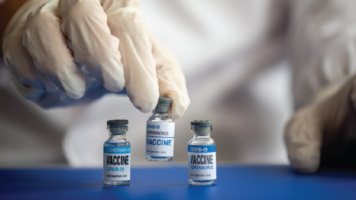COVID-19 News
COVID-19 Update | January 13, 2023
January 13, 2023

The California Biotechnology Foundation is committed to keeping you up to date about COVID-19 testing, treatment and prevention advancements. The following resources track what progress has been made as of January 13, 2022. Notable advancements include:
- A new study provides more evidence that the breast milk of people vaccinated against COVID-19 provides protection to infants too young to receive the vaccine
- Acceptance of COVID-19 vaccines has increased in the past year in the United States, with 8 in 10 people now saying they have been vaccinated or are willing to do so.
- In the first real-world test of vaccine boosters specially designed to protect against the Omicron variant, researchers found that people 65 and older who got an updated vaccine were 81% less likely to be hospitalized with COVID-19 than those who did not.
Recent News
- Breast milk of people vaccinated against COVID-19 provides protection to infants, study reveals
News Medical Life Sciences – January 12, 2023
A new study from the University of Florida provides more evidence that the breast milk of people vaccinated against COVID-19 provides protection to infants too young to receive the vaccine. This latest study follows up on findings published in 2021 showing that the breast milk of vaccinated people contained antibodies against SARS-CoV-2, the virus that causes COVID-19. The new study, published in the Journal of Perinatology, analyzed the stool of infants that consumed this breast milk and found SARS-CoV-2 antibodies there as well. Using a technique called a neutralization assay, the researchers showed that the antibodies found in the infants’ stool offered protection against the virus. - What to know about XBB.1.5
The New York Times – January 11, 2023
A highly contagious version of the Omicron variant — known officially as XBB.1.5 or by its subvariant nickname, Kraken — is quickly spreading in the U.S.The young subvariant was first detected in New York State in the fall. It currently makes up about 28 percent of cases in the U.S. and about 72 percent of cases in the Northeast, according to the C.D.C. It’s a highly mutated version of the virus that appears able to better evade immune defenses and invade cells, with some experts calling it the most transmissible variant yet. Scientists say it remains rare in much of the world, but they expect it to spread quickly and globally. - Bivalent COVID-19 vaccines have now been in use for a few months – here’s how they’re stacking up against omicron
The Conversation – January 11, 2023
Some of these variants carry mutations in their genomes which can increase the virus’ ability to transmit between people, evade the antibodies produced by our immune systems, or affect the severity of the disease. Omicron, the major driver of COVID-19 infections around the world at present, has more than 50 mutations in its genome and is highly transmissible compared with previous variants. Some of omicron’s mutations allow it to evade antibodies induced through prior infection, vaccination and antibody therapies. So, scientists got to work designing slightly adjusted formulations of the vaccines which would not only target the original strain of SARS-CoV-2, but newer variants of the virus too – omicron in particular. These are called bivalent vaccines. - Getting a COVID-19 vaccine during pregnancy benefits fetal health, new University of KY study finds
Lexington Herald Leader – January 11, 2023
New research co-authored by University of Kentucky researchers shows fetal benefits when a pregnant person is vaccinated against COVID-19. The study, funded by a National Institutes of Health grant, was published in the American Journal of Obstetrics and Gynecology in late November. It followed a group of 121 women from March 2021 until June 2022, through pregnancy, delivery and up to a year after giving birth. Each participant received two rounds of the vaccine and a booster shot. Close to 90% of the cohort got the Pfizer-BioNTech vaccine. Researchers found that antibodies from the vaccine “passively transfer from mother to fetus in utero, offering the most protection,” said Dr. Ilhem Messaoudi, chair of UK’s Department of Microbiology, Immunology and Molecular Genetics. - First real-world data show Omicron booster kept seniors out of hospitals
The Los Angeles Times – January 10, 2023
In the first real-world test of vaccine boosters specially designed to protect against the Omicron variant, Israeli researchers have found that people 65 and older who got an updated vaccine were 81% less likely to be hospitalized with COVID-19 than those who did not. Those results suggest that — in the initial weeks after vaccination at least — the Omicron-specific vaccines are even more effective than had been documented to date. The U.S. Centers for Disease Control and Prevention had assessed their efficacy in preventing hospitalization at between 31% and 73%. - COVID-19 Vaccine Acceptance Sees Dramatic Increase in U.S.: Survey
WebMD – January 10, 2023
Acceptance of COVID-19 vaccines increased 20% in the past year in the United States, with 8 in 10 people now saying they have been vaccinated or are willing to do so, according to results of a new global survey. The changing attitudes bring the U.S. in line with vaccine acceptance in other major countries. For both vaccines and boosters, acceptance was defined in the survey as receiving at least one dose or willingness to take one when available. - For most mild infections, long COVID-19 symptoms clear after a year, large study finds
Stat News – January 11, 2023
Since long COVID-19 emerged, how best to define it, predict it, and treat it has been up for debate, but perhaps the most urgent question for patients and providers alike has been how long it lasts. A new study analyzing nearly 2 million patient records in Israel concludes that for most people, the troubling symptoms that persist after a mild COVID-19 infection fade away after about a year. Just as estimates of long COVID-19’s prevalence have varied widely, so have conclusions about a variety of symptoms - COVID-19 vaccines: From nasal drops to a redesign, what 2023 could have in store
CBS – January 9, 2023
Several vaccine companies say they are expecting breakthroughs as early as this year as they pursue new ways to protect people against SARS-CoV-2, the virus that causes COVID-19. The Food and Drug Administration is set to convene a panel of its outside vaccine advisers later this month to weigh key issues over the future of COVID-19 vaccines, including when and how to greenlight new boosters and changes to which strain the vaccines target. - NIH funds eight studies to advance rapid diagnosis of COVID-19-related inflammatory syndrome in children
National Institute of Health – January 9, 2023
The National Institutes of Health has awarded eight research grants to refine new technologies for early diagnosis of severe illnesses resulting from SARS-CoV-2 infection in children. The new awards follow grants issued in 2020 to foster methods for diagnosing children at high risk for Multisystem Inflammatory Syndrome in Children, a rare, severe and sometimes fatal after-effect of SARS-CoV-2 infection or exposure in children.
Rely on California Biotechnology Foundation to monitor breaking news and provide updates on the latest advancements in COVID-19 diagnostics, vaccines and treatments.
Stay informed on the latest news and trends on the economic and health benefits of this industry by visiting the new CABiotech.org
If you have any questions about informational briefings contact California Biotechnology Foundation Executive Director Patty Cooper at (916)764-2434 or [email protected].


